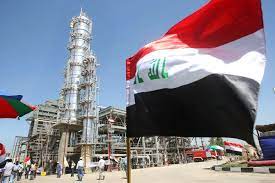Dr. Majid Rafizadeh
Throughout the two decades since the US invasion of 2003, Iraq has experienced instability and significant challenges. Although domestic armed conflicts have been reduced in recent years, the country still encounters other critical issues, which need to be resolved for the good of the stability and security of the country. Increasing cooperation between the Iraqi government and the Gulf nations is key.
One of the issues that Baghdad faces is the country’s security, since some groups may still seek to use a sectarian agenda as a means to divide the nation and ultimately gain power. It is worth noting that Iraq has a multiethnic and multireligious society that comprises Shiite Arabs, Sunni Arabs, Kurds, Turkmen, Christians, Assyrians, Yazidis and Armenians. In such a vibrant society, it is crucial for the political establishment to promote inclusive governance and a system of government that rejects any project or plan that is anchored in a sectarian agenda or a divide and rule philosophy.
In addition, it is important for the Iraqi government to promote programs that aim to increase interfaith dialogue in order to help reduce tensions and the potential for conflict. The more the government attempts to set up such programs, the more peace and stability it will likely bring. There are several countries in the region that Iraq can take lessons from and replicate their projects on a domestic level. One is Saudi Arabia. Over the past few years, Crown Prince Mohammed bin Salman has placed significant emphasis on interfaith dialogue, playing a key role in advancing and promoting his mission. Under his leadership, Saudi Arabia has been assertively embarking on outreach to other religious groups and faiths.
For example, in 2020, Saudi Arabia presided over an interfaith forum with the participation of Muslim clerics, Jewish rabbis, Christian priests and other religious leaders. And a multifaith conference was held in Riyadh in 2022, with the title “Common Values Among the Followers of Religions.” The conference was the first of its kind and about 100 religious leaders, including more than 15 rabbis, attended. Another example in the region is the UAE, which in March opened the Abrahamic Family House in Abu Dhabi to bring together the three Abrahamic religions: Judaism, Christianity and Islam.
At the same time, extremist ideologies, which aim to sow division and tension in Iraq, as well as recruit young people, must be confronted. The Iraqi government can advance and set up more organizations to track and monitor extremists’ activities online, including via social media platforms, blogs and websites. It is also critical to establish institutions that will promote an alternative and moderate ideology, while educating people and raising awareness of extremist ideologies. Again, Iraq can follow in the footsteps of some Gulf nations. For example, Saudi Arabia’s model has proven to be successful in fighting extremist ideologies. The Kingdom has established several organizations for this goal, including the Ideological Warfare Center, the Digital Extremism Observatory, the King Abdulaziz Center for National Dialogue, and the Global Center for Combating Extremist Ideology. The Iraqi government can challenge the messages of extremist groups by pursuing similar initiatives.
It should be noted that the Iraqi government has recently taken several important steps. One move was the recent action plan signed by Iraq’s Ministry of Labor and Social Affairs and the UN, which aims to prevent the recruitment and use of children by extremist groups and armed forces. Labor and Social Affairs Minister Ahmed Jassim Al-Asadi pointed out: “The Ministry of Labor and Social Affairs, as representatives of the government of Iraq, along with the National Committee for the Monitoring and Reporting Mechanism, would like to express its commitment to implement the plan to serve children exposed to recruitment in armed conflict, in order to ensure Iraq’s compliance with the Convention on the Rights of the Child as well as with the protocols signed by the Iraqi government. While we continue to work on implementing the national child protection policy as part of the government program, we are also supporting the Child Protection Law, pending parliament ratification.”
It is also important to point out that stability and security relies on a healthy and stable economy. Iraq, OPEC’s second-largest producer after Saudi Arabia, unfortunately heavily relies on oil exports for its revenues. Oil exports account for nearly 95 percent of Iraq’s federal budget revenue. Such dependence on oil puts the country at great risk when oil prices plummet, such as occurred in 2020. According to the International Monetary Fund, “Iraq’s economy remains in the grip of a self-perpetuating cycle of fragility … The absence of meaningful reforms, in turn, has held back economic development and reinforced dependence on oil – a critical vulnerability in a world that is fighting climate change.” Iraq also heavily relies on imported gas, particularly from Iran, in order to meet the demands of its population. Baghdad this month agreed to repay $1.6 billion of debt to the Iranian government in order to ensure a steady gas supply through the summer. Iraq itself holds about 111 trillion cubic feet of proven gas reserves, ranking it 12th in the world. However, years of conflict have prevented the Arab country from investing in its gas industry. Baghdad should prioritize attracting foreign investments in order to process gas from its reserves.
This is why it is vital for the Iraqi government to diversify its economy. This can be done by strengthening the private sector, investing in infrastructure and other industries, investing in renewable energy and promoting tourism. In a nutshell, Iraq faces several challenges, but these can be partially addressed by diversifying the country’s economy, promoting an inclusive system of governance and further cooperating with the Gulf nations.







